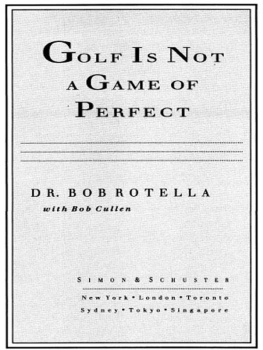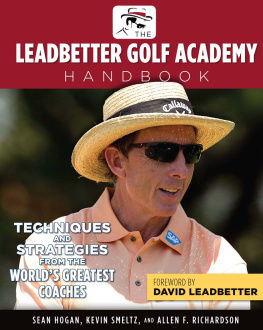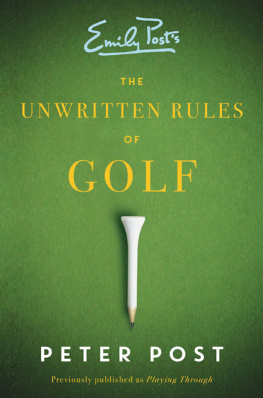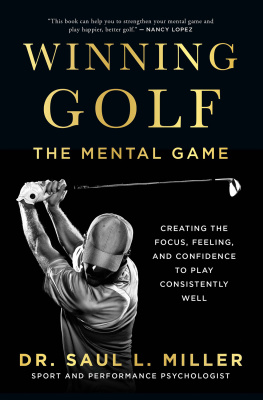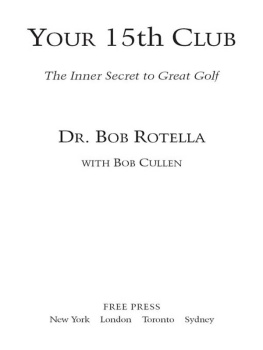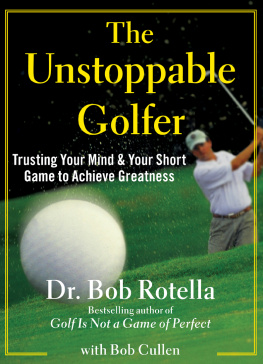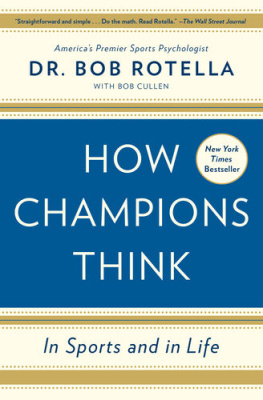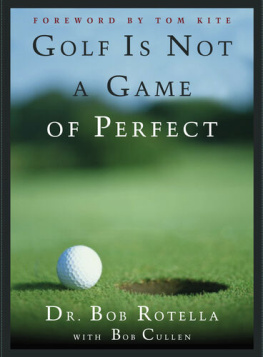Thank you for downloading this Simon & Schuster eBook.
Join our mailing list and get updates on new releases, deals, bonus content and other great books from Simon & Schuster.
A LSO BY D R . B OB R OTELLA
B OOKS :
Parenting Your Superstar
Scientific Foundations of Coaching
Psychological Foundations of Sport
Mind Mastery for Winning Golf
Mind, Set and Match
A UDIO T APES :
Golfing Out of Your Mind
Putting Out of Your Mind
CD-ROM P ROGRAMS :
Lower Your Score (with Tom Kite)

SIMON & SCHUSTER
Rockefeller Center
1230 Avenue of the Americas
New York, NY 10020
Copyright 1995 by Robert Rotella
All rights reserved,
including the right of reproduction
in whole or in part in any form.
S IMON & S CHUSTER and colophon are registered trademarks of Simon & Schuster Inc.
Library of Congress Cataloging-in-Publication Data is available
ISBN-13: 978-1-4165-6331-0
ISBN-10: 1-4165-6331-8
Visit us on the World Wide Web:
http://www.SimonSays.com
I dedicate this book to my loving, enthusiastic and always encouraging wife, Darlene and to my daughter Casey, for their constant support of my passion for coaching the minds and careers of athletes.
I dedicate it as well to all the fantastic golfers and teachers who have let me teach them, learn with them and learn from them. Thanks for the trust. Thanks for the honesty and candor. Thanks for the opportunity. And thanks for being willing to go for greatness.
Introduction
O VER THE PAST THIRTEEN YEARS , I VE BEEN FORTUNATE ENOUGH TO work with many of the greatest golfers in the world. This book is an effort to share with others who love the game what Ive taught some very successful golfers and what theyve taught me.
The psychology of great golf is quite plain and logical. Most players with whom I work are at first amazed by the simplicity of what I tell them. Theyre surprised to find that there is nothing weird or mysterious in what I do. With a bit of relief in their voices, they tell me that the type of thinking I teach strikes them as good common sense.
Sport psychology, as I teach it, is about learning to think in the most effective and efficient way possible every day. Its the psychology of excellence. My job as a coach of mental skills is to help players go where they might not be able to go on their own, given their old ways of thinking.
They may have learned ways of thinking that work on a driving range or a practice green. What I offer is a way of thinking and playing that works under the fire of competitive pressure, that breeds consistency, provides the best chance to go low, and helps players find a way to win.
The challenge lies not in understanding the concepts I teach, for, as Ive said, theyre simple and make common sense. The challenge lies in thinking this way every day on every shot.
To meet this challenge, golfers must understand the power within themselves. They must learn to tap this power and let it flow into their golf game.
One of my goals in writing this book is to expose people who love golf to the truth about free will. I am convinced that it is the power of will that separates great golfers from those who never reach their potential.
Though I teach psychology, I have never known for sure where the mind ends and where heart, soul, courage and the human spirit begin. But I do know that it is somewhere in this nexus of mind and spirit, which we call free will, that all great champions find the strength to dream their destinies and to honor their commitments to excellence. All great champions are strong on the inside.
They all learn that competitive golf either builds character or reveals character. They learn to be honest about their thoughts. They learn to relish the games mental and emotional challenges. They learn to appreciate the value of thinking in an athletic manner. Finally, they learn that golf is a game, and it has to be played.
I also know that its all too easy, in this age of videotape, for the media to overlook the role of the mind. Television cameras cant take pictures of thoughts. But anyone who plays championship golf will tell you that at least half the battle occurs inside the golfers mind.
This book will equip you for that challenge. Because I think its important to learn from the experience of other players, Ive drawn lots of illustrations from the history of the game and from conversations Ive had with the players I teach. I hope these anecdotes will help readers understand and remember the principles I want to convey. They are the honest truth about golfing excellence.
Read and enjoy.
Contents
Foreword
By Tom Kite
T HROUGHOUT THE YEARS, THERE HAS BEEN A GREAT DEAL OF DISCUSSION about the game of golf and about improving scores. Invariably, the discussion turns into a debate on exactly how much of the game is physical and how much is mental. Generally, the better a player is, the higher the percentage he will attribute to the mental side. Thats reasonable. A beginner, who has very little control over his swing, cant be expected to understand that the game is 80 percent or 90 percent mental. But on the PGA Tour, where all the players can hit quality shots, the mental side is at least 90 percent of the margin between winners and losers. Percentages aside, no matter what a players handicap, the scores will always be lower if the golfer thinks well.
There have been untold thousands of instruction books written on golf. Most have chapters on the grip, the stance, posture, swing plane, alignment, and the rest of the games mechanics. But, given the mental side of the games importance, far too little has been written on it. There must be reasons for this. Maybe its because its impossible to see what a person is thinking. Many times I have had fans tell me how cool I looked on the course, when all I could remember was how scared or nervous I had been. Or, possibly, its because the top players, those who have found an effective way to think on the course, are very protective of any thoughts that might aid an opponent. Or maybe its because few people have studied the mental side of golf compared with the vast number who have studied the swing. But for whatever reason, accurate information on the mental side of the game is long overdue. Bob Rotellas bookthis bookis it.
I met Doc in 1984 at the Doral Open in Miami. I was in one of those phases where I just couldnt seem to do anything right on the course, and my scores showed it. I hadnt had a top finish for months, and winning a tournament seemed as far away as the moon. But after a couple of meetings early in the week, when Doc did no more than refresh my memory of those great thoughts I usually have when I am playing my best, I went out and actually won the tournament, beating none other than Jack Nicklaus down the stretch. My swing hadnt changed at all in the couple of days since the last event. But I was like a new person. All of a sudden, I could hit shots that I could not even imagine the week before. My patience level increased dramatically. Even my walk was confident. I had a new best friend, and it was me!
In the first twelve years of my life on the PGA Tour, I had established myself as a pretty decent player but had only won five official tournaments. In the ten years since meeting Doc, I have won fourteen tournaments, played on the Ryder Cup team, and won my first major, the U.S. Open. To say that I think Doc has helped make me a better player would be an understatement. I now realize that I must spend as much time working on a good mental approach as I do hitting balls on the practice tee.

